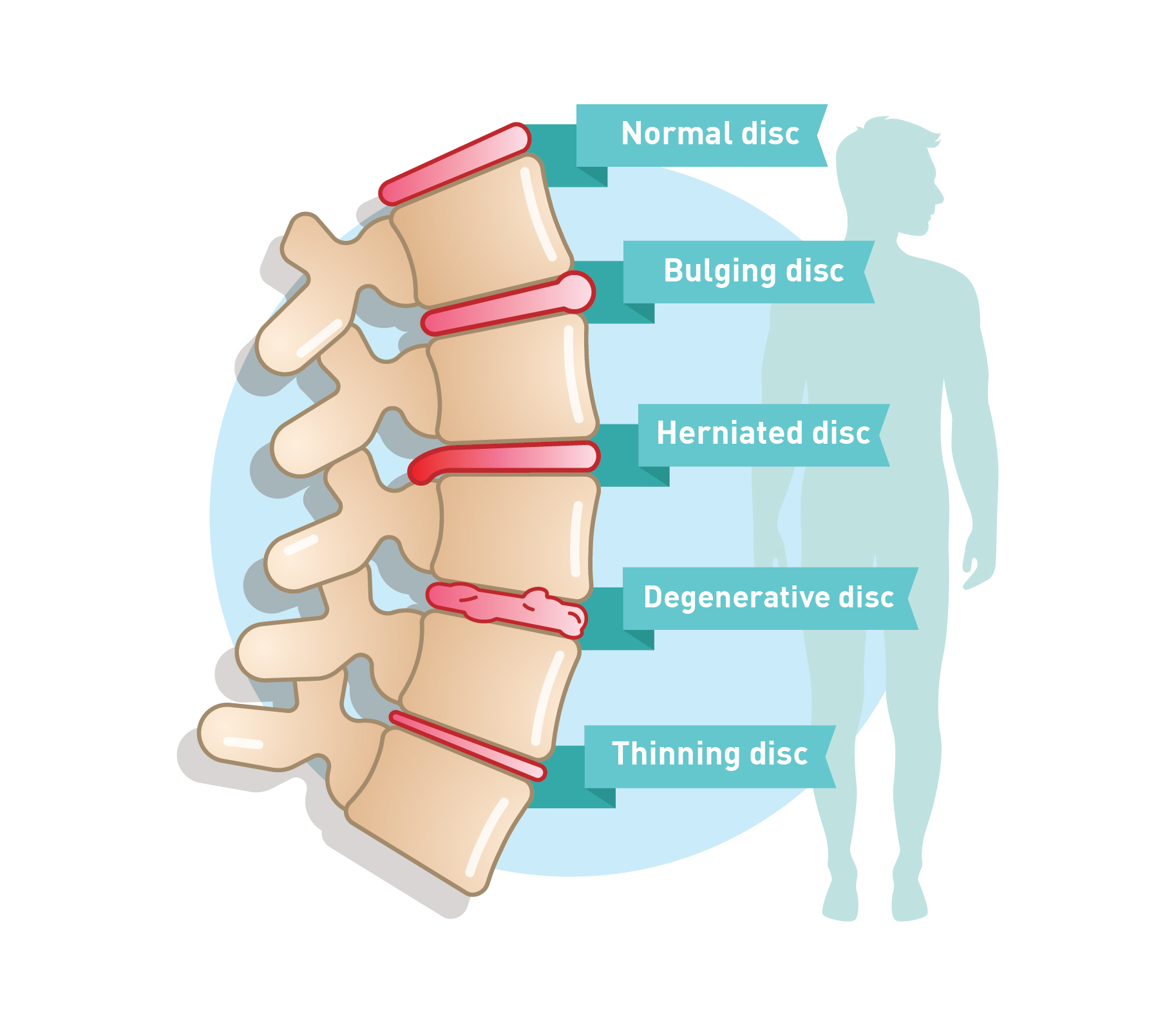Request Appointment
Enter your details and we will be in touch with you shortly;
Or call
8655885566
between 8 am and 8 pm.

Degenerative disc diseases is the deterioration of intervedrtebral disc due to ageing

Spinal discs are made up of cartilage and provide natural cushioning for the spinal vertebrae. Damage to any of these discs is likely to result in chronic back pain and the location of the pain will depend on the position of the damaged disc. Some of the most common degenerative disc disease symptoms include:
 Professional diagnosis required
Professional diagnosis required Chronic, can last for years
Chronic, can last for years Treatable with 8 weeks of QI Spine Therapy
Treatable with 8 weeks of QI Spine TherapyThe center of a healthy disc can contain up to 80 per cent water which allows it to function as a shock absorber. When the water content in these discs starts to decrease, they are no longer as spongy and flexible which puts pressure on the outer layer of the disc.
Pressure on the outer layer of a disc can result in the development of small tears. The jellylike material from inside the disc can then seep through these cracks – a condition known as a herniated disc.
 Professional diagnosis required
Professional diagnosis required Chronic, can last for years
Chronic, can last for years Treatable with 4 weeks of QI Spine Therapy
Treatable with 4 weeks of QI Spine TherapyDisc fusion surgery is often recommended for degenerative disc disease. There have been several innovations including pedical screws, fusion cages, and artificial discs but these technological advances have not translated into improved outcomes. In fact, studies show that surgery for degenerative disc disease is associated with increased disability and higher opiate use. QI Spine has adopted a unique approach that combines holistic therapy with evidence-based treatment protocols. This ensures quick and last pain relief from back pain caused by degenerative disc disease. Some of the main aspects of QI Spine treatment include:
MRI and X-ray tests are the most common conventional diagnostic tools for back ailments. These tests can only detect damage to bone and tissue but they cannot pinpoint weakened muscles that cause or exacerbate the problem. The Digital Spine Analysis (DSA) is the most technologically advanced spine function test that can identify weakened muscles. This allows spine specialists to provide precise and targeted treatment for quick but lasting pain relief.
Degenerative disc disease causes pain at the site of the damaged disc, which is generally in the lower back. COX-2 inhibitors are among the most commonly used NSAIDs for degenerative disc disease back pain. However, these are strong medications that increase the risk of upper respiratory tract infections including pharyngitis, sinusitis, and rhinitis. These drugs also increase the risk of more serious adverse reactions including gastrointestinal bleeding, ulcers, and perforation of the intestine and stomach. QI provides non-pharmacological pain management methods such as Frequency Specific Microcurrent (FSM). This is a technologically-advanced method of pain management that utilizes low levels of electric current to reduce pain and promote tissue repair. This helps to decrease the inflammation around an affected disc.
QI customizes every treatment protocol depending on the needs of each patient in order to reduce pain as well as prevent the recurrence of the underlying problem. QI’s treatment protocols are derived from an algorithm based on over 47,000 past cases – this ensures that every patient with degenerative disc disease receives treatment that is best suited to his/her needs. The McKenzie Method is an effective physical therapy system to correct and stabilize spinal alignment. Medical movements such as the Global Stabilization System and kinetic control focus on improving mobility, reducing pain, and reducing the risk of pain recurrence. Smokers, those who are overweight, and people who are overweight or obese have a higher risk of suffering from degenerative disc disease. If you suspect that you have degenerative disc disease, visit a spine specialist as soon as possible.
 Professional diagnosis required
Professional diagnosis required Chronic, can last for years
Chronic, can last for years Treatable with 4 weeks of QI Spine Therapy
Treatable with 4 weeks of QI Spine TherapyDisc fusion surgery is often recommended for degenerative disc disease. There have been several innovations including pedical screws, fusion cages, and artificial discs but these technological advances have not translated into improved outcomes. In fact, studies show that surgery for degenerative disc disease is associated with increased disability and higher opiate use. QI Spine has adopted a unique approach that combines holistic therapy with evidence-based treatment protocols. This ensures quick and last pain relief from back pain caused by degenerative disc disease. Some of the main aspects of QI Spine treatment include:
 Professional diagnosis required
Professional diagnosis required Chronic, can last for years
Chronic, can last for years Treatable with 4 weeks of QI Spine Therapy
Treatable with 4 weeks of QI Spine Therapy


Have a question?
Ask our spine specialists
Who is a QI Spine Specialist?
A QI Spine Specialist is a medical expert with

Dr. Nidhi Sanghvi Shah

Dr. Shital Gaikwad

Dr. Richa Bhatia
9000 hours
of specialisation in treating back and neck conditions
32 hours
of spine physiotherapy specialisation methods in McKenzie concepts, Kinetic control, Neurodynamic solutions, Mulligan’s concepts
500 hours
and 6 months of QI Spine specialisation courses